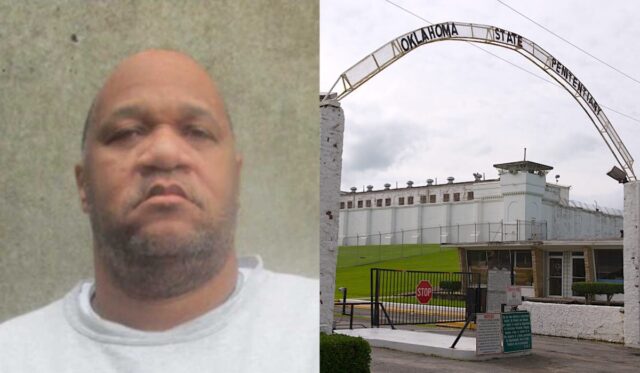
Despite a recommendation from Oklahoma’s Pardon and Parole Board to grant him clemency, the state carried out the execution of Emmanuel Littlejohn this morning.
Littlejohn was declared dead at 10:17 a.m., according to media witnesses and McAlester News-Capital editor Derrick James.
With the Pardon and Parole Board’s recommendation to commute Littlejohn’s death sentence to life without the possibility of parole, his fate fell to Gov. Kevin Stitt, who ultimately took no action despite the board’s recommendation and concerns about whether Littlejohn himself had been the triggerman in a fatal 1992 robbery. On Wednesday, a representative from Stitt’s office told NPR the governor “continues to prayerfully and carefully consider the facts, evidence, and recommendations,” but Stitt never made a formal announcement of his decision ahead of the execution.
At 10:25 a.m., however, Stitt broke his silence.
“These decisions are very difficult and I do not make them lightly,” Stitt said in an emailed statement. “Mr. Littlejohn murdered an innocent man 32 years ago while robbing a convenience store. A jury found him guilty and sentenced him to death. The decision was upheld by multiple judges. As a law and order governor, I have a hard time unilaterally overturning that decision. Today, justice for this life lost was carried out. I hope this brings closure to the families impacted by this murder.”
Littlejohn, 52, was sentenced to death for the 1992 murder of Kenneth Meers, a convenience store owner. Littlejohn and accomplice Glenn Bethany robbed Meers’ store in Oklahoma City, and one of the two men killed Meers with a single gunshot to the head — but both men were charged by Oklahoma County District Attorney Bob Macy and convicted of committing the murder.
In 1998, the Oklahoma Court of Criminal Appeals ordered a resentencing for Littlejohn, but a second jury again sentenced Littlejohn to death in 2000. Bethany was convicted of shooting and killing Meers in 1993 and sentenced to life in prison without the possibility of parole. In Littlejohn’s clemency petition, his attorneys argued that because Littlejohn was convicted in 1994 of the same crime a year after Bethany’s trial, the two men’s prosecutions were “inconsistent.”
In an interview with NBC, Littlejohn said he and Bethany robbed the convenience store because they owed a drug dealer $1,500. He maintained he did not fire the shot that killed Meers.
“All I know is when I left the store, Mr. Meers was still alive,” Littlejohn said. “I didn’t kill Mr. Meers.”
In August, Littlejohn told USA Today he took responsibility for his role in the robbery, but he reiterated the claim that he did not fire his gun. In the same interview, he said if he could speak to Meers’ family, he would ask for their forgiveness. Members of Meers’ family later told the publication they supported Littlejohn’s execution.
“I understand their emotions and I pray for them. But I didn’t kill their son,” Littlejohn said.
The Oklahoma Pardon and Parole Board voted 3-2 on Aug. 7 to recommend clemency to Littlejohn. Oklahoma Attorney General Gentner Drummond expressed displeasure at the time, saying, “My office intends to make our case to the governor why there should not be clemency granted to this violent and manipulative killer.”
In recent years, the Oklahoma Pardon and Parole Board has recommended clemency about a half-dozen times, with Stitt declining to intervene in all instances except for his commutation of Julius Jones’ death sentence to life in prison without the possibility of parole. Stitt’s decision to commute one sentence while denying other similar recommendations has confused observers and raised questions about the consistency of his considerations.
“I am deeply disappointed that Gov. Stitt did not follow the recommendation of his hand-picked Pardon and Parole Board to grant clemency and stay the execution of Emmanuel Littlejohn,” Rep. Jason Lowe (D-OKC) said in a statement. “The death penalty should never be used when doubts remain about a defendant’s guilt. I will continue to pray for both the Meers and Littlejohn families.”
Attorneys: Sentencing confusion misled jurors
The clemency petition included the sworn affidavits of two jurors from Littlejohn’s 1994 and 2000 sentencing hearings, respectively. The juror from 1994 characterized herself as “one of the holdouts” when deliberating on assigning Littlejohn the death penalty, but she ultimately voted in favor of the death penalty because she feared “a life sentence even without parole could be changed and he might have a chance to get out of prison.”
Short of a vacated sentence or commutation, life without the possibility of parole means an offender will be imprisoned for life. Commutation for those serving such sentences is exceptionally rare. According to a 2024 study published by Northwestern University Law Review, from 1990 to 2021, 388 inmates serving life without parole for state-level convictions had their sentences commuted to lesser punishments, 134 of whom were convicted of murder. For context, there were 52,059 inmates serving life sentences without possibility of parole at state levels nationwide in 2020.
A juror from 2000 expressed similar concerns to the 1994 juror, stating that some jurors at the resentencing trial believed Littlejohn “would eventually be released from prison even if [the jury] gave him life without parole.”
Seeking clarification on the meaning of life without possibility of parole, the 2000 resentencing jury submitted a note to the trial court asking, “Is it possible to change the verdict of life without parole to with parole after our verdict and without another jury verdict?” The court rejected a request by defense counsel to elaborate on the available sentencing options, and instead told the jury it had “all the law and evidence necessary to reach a verdict.”
The juror from 2000 said clarification would have been helpful to the jury. The juror’s affidavit said she was initially against sentencing Littlejohn to death but was “not sure what would have happened” had she voted against it, fearing it could result in a mistrial. In retrospect, she said she “would not vote for death” but instead “for life without the possibility of parole and stick with it.”
Littlejohn executed among four others this week
Stitt’s decision comes two days after the state of Missouri executed Marcellus Williams for the murder of journalist Lisha Gayle, despite a prosecutor in the case saying DNA evidence “conclusively excluded” Williams as the perpetrator and Gayle’s family stating they “define closure as Marcellus being allowed to live.” Missouri Gov. Mike Parson and the Missouri Supreme Court denied Williams’ clemency request Monday, and the U.S. Supreme Court rejected a final appeal to spare Williams’ life Tuesday evening by a vote of 6-3.
About an hour after Williams’ execution Tuesday night in Missouri, the state of Texas executed Travis Mullins for killing his 3-month-old son. Since executions resumed in 1977 after a five-year moratorium, Texas has led the nation with the most executions. From 1977 to January 2024, 1,582 executions occurred nationwide, with Texas responsible for 586. Despite a moratorium from 2015 through 2021 owing to protocol issues and a pair of botched executions, Oklahoma has had the next highest number with 123.
The five executions scheduled nationwide in the span of a week mark the highest seven-day total since 2003, according to the Associated Press. Littlejohn’s execution was America’s fourth since last Friday, when South Carolina executed Freddie Owens for killing a convenience store clerk during a robbery. Owens’ execution marked the first time South Carolina used a single drug, pentobarbital, instead of a three-drug cocktail as a means of execution.
This evening in Alabama, Alan Miller is set to be executed by nitrogen gas for killing three of his coworkers in 1999. Alabama became the first state to carry out an execution using nitrogen gas in January, and Miller is scheduled to be the second recipient of the procedure. Rev. Jeff Hood, a spiritual advisor who had witnessed seven executions prior to attending Littlejohn’s in McAlester this morning, described nitrogen hypoxia as the most violent process he has ever seen.
In August, a retired chief medical examiner of New Hampshire told the Associated Press those killed via nitrogen gas will have the sensation of suffocating as they die.
“I think that’s a critical critique of the protocols used in this form of execution,” Dr. Thomas Andrew said. “You certainly will have a sense of the absence of oxygen, air hunger, and all of the panic and discomfort that is part and parcel of that way of dying.”






















